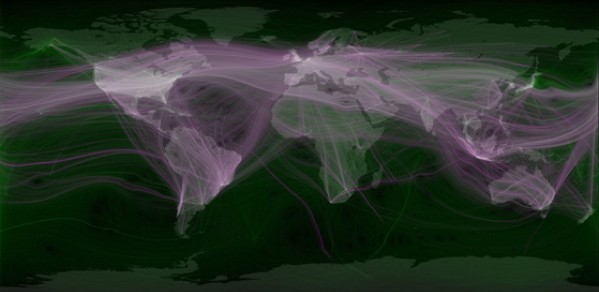
A new software-defined dark fibre optical network will enable researchers to create and develop vital communication technologies for the future of the internet.
We will be working with leading UK companies to transfer technologies developed with the aid of NDFIS into new products and services. The benefits to the UK economy will be correspondingly large.
Professor Alwyn Seeds
The UK Engineering and Physical Sciences Research Council (EPSRC) has provided £2.5million to fund the National Dark Fibre Infrastructure Service (NDFIS) project over the next five years. Led by UCL, the consortium features leading academics from the Universities of Bristol, Cambridge and Southampton.
NDFIS will provide access to a dedicated dark fibre network connecting these universities, with onward connection to European and Worldwide research networks via telecommunications facilities in London. The network will be engineered with equipment that can be configured remotely and dynamically, and will be an example of a Software Defined Network (SDN).
These fibre connections, comprising some 800 km of single mode fibre, together with control and monitoring systems, will be provided to NDFIS by Janet, part of the Jisc group. Researchers in the UK will be able to access the new network, to be named Aurora2, both directly by placing equipment at consortium sites and remotely using the Janet Lightpath service.
Janet is the network dedicated to the needs of research and education in the UK. It connects the UK’s research and education institutions to each other, as well as to the rest of the world through links to the global Internet. Over 18 million end-users are currently served by the Janet network.
Professor Richard Penty, who with Professor Ian White leads the Cambridge team based at the Department of Engineering, said: "The Centre for Photonic Systems is very pleased to be part of this important national facility and to be able to play a role in bringing new photonic communication technologies closer to commercialisation
“Our role is to act as one of the nodes. The idea is that third party groups, both university and industry researchers, can book time on the network. They can come into our labs and run their own experiments for extended field trials. This is an expensive resource which can be shared in this way, with support from researchers here and in the other partner universities.”
Dark fibre is optical fibre that users can access at the optical data level rather than the electrical data level as in conventional communications networks. Access at the optical level enables users to experiment with novel communication techniques, such as high-order optical modulation or quantum communication. The new service builds on previous work carried out by the consortium using a fixed path dark fibre network, Janet Aurora. The new network will offer programmable transmission parameters, dynamic reconfiguration into multiple sub-networks and the ability to handle multiple transmission formats simultaneously.
As well as supporting research on the future core optical network, which underpins the internet, NDFIS will also enable research with experimental metro networks, such as the Gigabit Bristol network. NDFIS will also support research on wireless backhaul networks for future Wireless Systems such as 5G.
NDFIS Director, Professor Alwyn Seeds from UCL Electronic and Electrical Engineering said:
“We are delighted that the EPSRC and Janet have enabled the creation of the new National Dark Fibre Infrastructure Service. This will enable UK researchers to remain at the forefront of technology research for the future internet.
"UK photonics and UK electronics are large industries with annual revenues of £10 billion and £29 billion respectively. We will be working with leading UK companies to transfer technologies developed with the aid of NDFIS into new products and services. The benefits to the UK economy will be correspondingly large."

